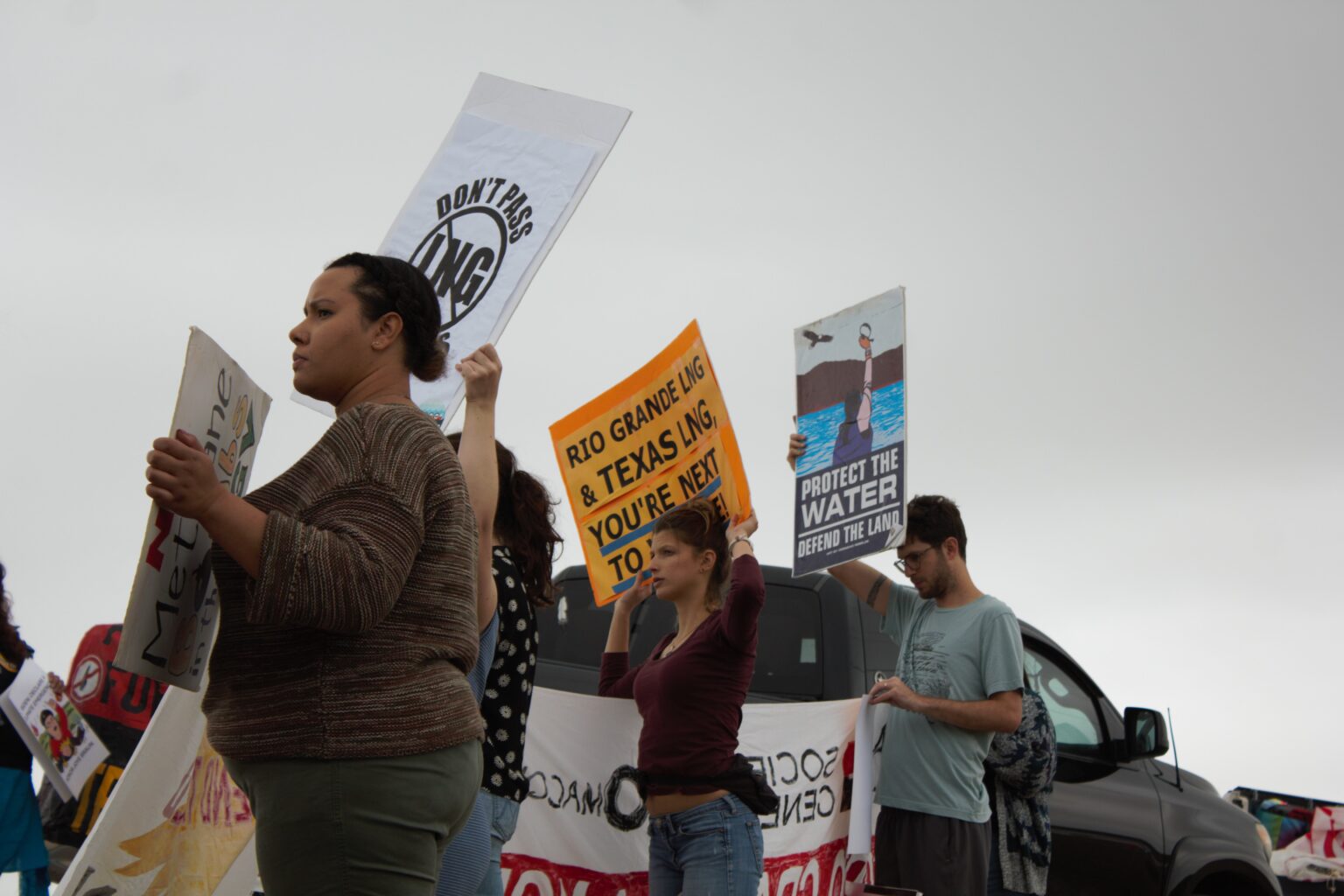The NextDecade Rio Grande LNG terminal won’t have a carbon capture component, the company told federal regulators in a filing Tuesday, walking back the company’s heavily marketed plans to make a “lower carbon intensive LNG project.”
“[A]s demonstrated by Rio Grande’s inability to respond to the outstanding data requests, the Project is not sufficiently developed to allow Commission review to continue,” attorneys for Rio Grande LNG wrote in a letter to the Federal Energy Regulatory Commission (FERC) filed today.
In 2021, the company tacked a carbon capture piece onto their Brownsville, Texas, LNG export project. That move came after the D.C. Circuit Court of Appeals found FERC had failed to properly consider the project’s climate impact.
Subscribe to our newsletter
Stay up to date with DeSmog news and alerts
The $18.4 billion Rio Grande LNG export terminal project is currently under construction, with building underway on its first three natural gas liquefaction units. This month, the company inked a contract to build a fourth unit at Rio Grande, valued at $6.1 billion.
But NextDecade hit a major setback two weeks ago, when the D.C. Circuit Court of Appeals tossed out FERC’s approval for the Rio Grande LNG export project.
“We appreciate the significant disruption vacatur may cause the projects,” the D.C. Circuit wrote. “But that does not outweigh the seriousness of the Commission’s procedural defects.”
In tossing out FERC’s approval for Rio Grande, the D.C. Circuit found regulators failed to properly consider how that terminal and another proposed LNG project nearby would impact environmental justice communities in Cameron County, Texas. FERC also hadn’t properly reviewed the impacts of the carbon capture element of Rio Grande, the D.C. Circuit found. For over a year, Rio Grande had failed to give FERC “complete and timely” responses to the Commission’s requests for information on the carbon capture project.
NextDecade had claimed its CCS project would capture at least 90 percent of the carbon emissions from the LNG terminal, while harvesting valuable 45Q tax credits that are designed to give taxpayer subsidies to carbon sequestration projects.
Environmental groups had labeled NextDecade’s CCS proposal a “band-aid,” as DeSmog previously reported, comparing the company’s plans to capture more than 5 million tons per year of carbon dioxide to the project’s full climate impact of up to 163 million tons of carbon dioxide equivalent per year — a total reduction of just three percent.
Project opponents also pointed out that Rio Grande LNG had highlighted the voluntary nature of its carbon capture addition in regulatory filings, warning that the company might not be serious and that the technology involved was unproven.
In a January 2022 filing, NextDecade called Sierra Club’s concerns that the company wasn’t dedicated to using carbon capture at Rio Grande “unsupported, near-conspiratorial allegations.”
“We appreciate the FERC’s diligence during the review process,” NextDecade Chairman and CEO Matt Schatzman said in a statement today. “The CCS project at RGLNG is not sufficiently developed to allow FERC review to continue at this time. We remain committed to advancing and lowering the cost of utilizing carbon capture and storage and helping companies reduce their facility emissions and achieving their clean energy goals.”
LNG Greenhouse Gas Concerns
Rio Grande had initially struggled to find buyers in Europe in part because of fracking and LNG’s environmental reputations. French power company Engie canceled talks for a $7 billion contract in 2020 over concerns from the French government, a major shareholder in Engie, about the potent greenhouse gas methane.
“Rampant flaring and methane leaks in the Permian basin in West Texas have tarred the industry’s reputation, and the decision by Engie to back away from Rio Grande LNG sent a message to drillers and gas exporters across the country that fracked American gas may be too dirty for some buyers,” Gas Outlook reported in 2023. And that’s before accounting for the LNG project’s own emissions. “During normal operations, the terminal will emit more than 8 million tonnes of CO2 equivalent per year, along with an array of hazardous air pollutants, volatile organic compounds, carbon monoxide, and nitrogen oxide. If and when it comes online, it will be the largest polluter in the Rio Grande Valley.”
In April 2022 — after NextDecade said it would add the carbon capture component — Engie signed a deal with Rio Grande LNG.
“The signing of this [sales and purchase agreement] is an important step in showing our commitment in the areas of environmental stewardship, social responsibility and governance best practices while upholding the LNG industry’s highest standards,” Schatzman said as NextDecade announced that deal. “It also shows how we can help meet our buyers’ climate change initiatives while providing them access to secure energy supply.”
Engie did not immediately respond to a request for comment.
In response to today’s announcement, environmental advocates called on FERC to act as more than a “rubber stamp for industry’s preferences” as it considers what to do with Rio Grande LNG in the wake of the D.C. Circuit ruling.
“For three years, NextDecade has insisted to FERC and the public that it would implement a carbon capture and sequestration project that would reduce Rio Grande LNG’s egregious greenhouse gas emissions by at least 90 percent,” Nathan Matthews, a senior attorney with the Sierra Club, told DeSmog. “As the D.C. Circuit Court just held in its Aug. 6 decision, FERC now needs to take a hard look at carbon capture, whether or not NextDecade would prefer to move on.”
“Industry doesn’t get to decide for itself how much pollution control is enough,” Matthews added.
Subscribe to our newsletter
Stay up to date with DeSmog news and alerts







